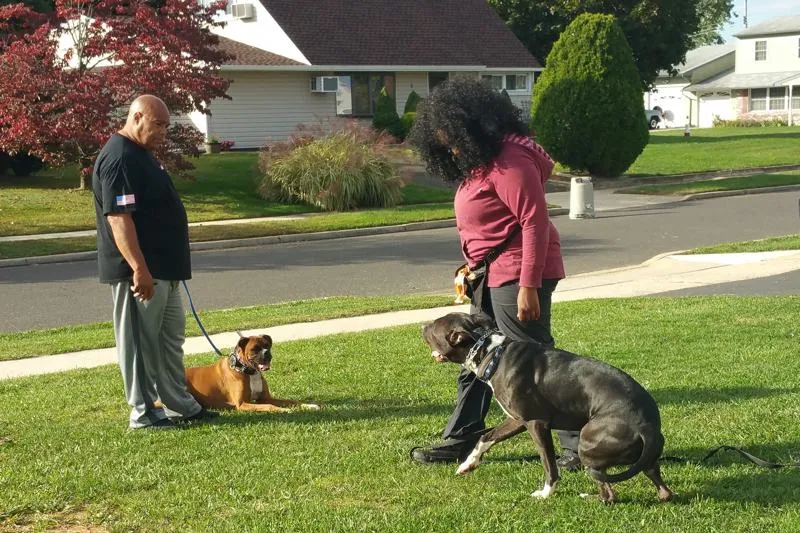Are you struggling with your dog’s challenging behaviors and searching for effective Behavior Modification Training For Dogs Near Me? At Dog Care Story, we understand the frustration and concern that comes with canine aggression, anxiety, and destructive habits. These issues not only impact your dog’s well-being but can also strain your relationship and disrupt your household peace. Whether it’s persistent barking, fear-based reactions, or more severe aggression, finding the right support is crucial for both you and your furry companion.
Many dog owners face these difficulties, often feeling overwhelmed and unsure where to turn. While some issues might seem minor, like a [dog wont stop scratching door](https://dogcarestory.com/dog-wont-stop-scratching-door/), others, such as aggression, can pose serious safety risks. At Anderson K9 Training, we specialize in transforming these behaviors, providing structured and proven methods to help your dog become a calm, well-adjusted member of your family. Our commitment is to deliver high-quality, professional dog training services tailored to your specific needs.
Anderson K9 Training: Your Partner in Canine Behavioral Change
When dealing with moderate to severe dog behavior issues, Anderson K9 Training offers expert assistance. Our lead trainer, Asa, brings over 30 years of invaluable experience as a police dog trainer, a background that underscores his deep understanding of canine psychology and behavior modification techniques. He emphasizes the critical importance of addressing negative canine behaviors promptly, before they escalate. Asa’s specialized expertise allows him to tackle a range of issues, from minor nuisances to complex behavioral challenges, ensuring a holistic approach to your dog’s training needs.
 Experienced K9 trainer Asa demonstrating dog behavior modification techniques
Experienced K9 trainer Asa demonstrating dog behavior modification techniques
Key Reasons to Enroll in Professional Behavior Modification
Investing in professional behavior modification training for dogs near me can yield numerous benefits, fostering a happier, safer environment for everyone involved. Here are four compelling reasons why enrolling your dog in a specialized program is a wise choice:
- Enhanced Socialization: If your dog exhibits excessive aggression toward people or other dogs, they present a potential hazard. Such behaviors can put friends, family, and neighbors at risk. Our training helps your dog learn appropriate social interactions, reducing reactivity and promoting safe encounters. This is especially vital for preventing
[most common dog behavior problems](https://dogcarestory.com/most-common-dog-behavior-problems/)that stem from poor socialization. - Improved Obedience: Does your dog ignore commands to stop or come when called? A lack of reliable obedience can have serious consequences, especially if your dog gets loose near busy roads or crowded areas. Our programs strengthen your dog’s obedience, making them more responsive and ensuring their safety for many joyful years to come.
- Increased Happiness: Dogs are inherently social animals and thrive when they understand their role within the family “pack.” Establishing clear boundaries and consistent leadership through training helps them feel secure and content, leading to a happier, well-behaved companion. Addressing issues like
[shih tzu puppy behavior problems](https://dogcarestory.com/shih-tzu-puppy-behavior-problems/)early can prevent future distress. - Saving Lives: Tragically, many dogs with severe behavioral issues are surrendered or euthanized. Through rehabilitation and desensitization training, we have successfully transformed numerous dogs, preventing them from being destroyed. Our goal is to help save your dog’s life by addressing and correcting deep-seated behavioral problems.
Overnight Board & Train Option: Intensive Behavioral Modification Training
For dogs facing severe challenges such as aggression, biting, or intense fear, our 2 to 4-week Overnight Board & Train program offers an intensive solution. This program is specifically designed for dogs that have bitten or attacked another dog or person, or those with deeply ingrained reactive behaviors. We’ve found that severely reactive dogs require a dedicated environment to truly rehabilitate and build trust in leadership and boundaries.
The process begins by removing the dog from their familiar environment, allowing us to establish a solid foundation for new learning. Once this foundation, structure, and leadership are firmly in place, we focus on shifting the dog’s state of mind from anxious, fearful, or nervous to calm and collective. This transformation makes unwanted behaviors significantly more controllable. We also address [dog behavior problems pooping in house](https://dogcarestory.com/dog-behavior-problems-pooping-in-house/) and other common issues during this immersive period.
This comprehensive training package includes a 30-minute consultation on the day you drop off your dog, followed by a 2-hour pick-up session. During this follow-up, our trainer will thoroughly transfer all essential information, techniques, and strategies to you, ensuring continued success at home. Each board and train program includes an e-collar, a prong collar, and two follow-up lessons to support your dog’s ongoing progress.
Note: Dogs exhibiting aggression may require more than two weeks of training. All cases involving aggressive behavior necessitate an initial consultation to accurately assess the level of aggression, and pricing will be quoted following this assessment.
Take the First Step Towards a Harmonious Life
If you’re searching for effective behavior modification training for dogs near me, Anderson K9 Training is here to provide the expertise and support you need. Don’t let your dog’s challenging behaviors control your life any longer. Contact us today to schedule a consultation and discover how our specialized programs can help your dog achieve a balanced, happy, and obedient life. Let us guide you and your dog toward a future of mutual understanding and companionship.
